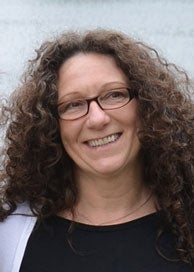 KINGSTON, R.I., Oct. 22, 2015 – Judy Van Wyk has been helping troubled teenagers get on the right path for years. Her conclusion: Some teens do better in a residential facility than at home or in prison.
KINGSTON, R.I., Oct. 22, 2015 – Judy Van Wyk has been helping troubled teenagers get on the right path for years. Her conclusion: Some teens do better in a residential facility than at home or in prison.
The University of Rhode Island sociology professor explores that finding and more in a new book, “Turning the Tide of Male Juvenile Delinquency: The Ocean Tides Approach.” She co-wrote the book with Lawrence Grebstein, professor emeritus of psychology at URI.
The book is an exhaustive study of Ocean Tides, a residential facility for boys in Narragansett. The URI professors have been conducting research at the school for years.
The professors spent more than a decade collecting and examining information from teens who lived at the school from its opening in 1975 through 2006. Most of the teens are on probation or have been at the Rhode Island Training School, a state prison for juveniles.

Their research found that innovative and successful counseling and other rehabilitation programs are effective for treating boys who have been victimized by family and other types of violence.
Prison and home confinement are less successful ways to treat the teens, they say. There is little rehabilitation in prison, and, at home, young people are often exposed to violence.
A signing for the new book will be held tomorrow, Oct. 23, at Ocean Tides, 635 Ocean Road, Narragansett, R.I. The event is being held during a fundraiser for the school from 6 to 9 p.m. The cost is $75 per person.
The book is available at “Turning the Tide of Male Juvenile Delinquency: The Ocean Tides Approach.” For more information about the fundraising event, contact Holly Palaia at 401-789-1016.
URI chatted with Van Wyk about her new book and whether our society does enough to help troubled teens.
Why is a place like Ocean Tides so important?
Ocean Tides provides a systems approach to care and rehabilitation – targeting the boy’s needs and the family’s needs, while keeping society safe through that transition. Prison or in-home care cannot do all that.
What is our responsibility as a society to help these young people?
This is a good question because rehabilitating juvenile offenders is not just about the boys. It’s about creating a safer, more stable and productive society. It’s also not just about the costs that untreated juvenile offenders transmit to society as they age through the criminal justice and mental health systems. These boys are not useless; they have good things to contribute to society and if we don’t help them now, the rest of society loses their future contributions.
What leads to violent behavior among teens?
Violence is one way to relieve strain. Most of us don’t act violently because we have the social skills and resources to relieve strain in other, more legitimate ways. For some people, violence is a more viable option.
How important is family life raising a healthy adult?
Family is the most important influence on a young child’s life. Once they hit adolescence, they are more strongly influenced by peers, but a boy who suffers from a weak family life is only going to have friends who have also suffered from the same problem. It’s like a snowball gathering momentum as it tumbles through life.
Is the state doing enough to help troubled teens?
The state is following national trends. For decades in the United States, the prevailing philosophy in juvenile justice was to lock them all up and punish them. That didn’t work. Now the federal government has done an about face and wants to keep them at home and provide mental health care and counseling to families instead. That’s not a bad plan since we know that prison actually increases criminality instead of deters it. The problem is that for about half of the boys in the criminal justice system, their families are a worse influence on their behavior than prison is. For those boys, we need an alternative that provides some form of surrogate parenting while the boy and family members receive treatment.
Is it more expensive for the state to send youths to the Training School than a place like Ocean Tides?
My research shows that it is about one third the price to send a boy to a program like Ocean Tides for a year than it is to incarcerate him in a youth prison.
Tell us about your new federal grant.
The first project produced a database of information on the boys who entered the Ocean Tides program from 1975 through 2006. Rhode Island implemented massive changes in and around 2006 in the allocation of funding to various mechanisms of the Rhode Island juvenile justice system. These changes seriously affected the Ocean Tides program and other programs like it. Ocean Tides had to close all but one of its extension houses and boys no longer spend a full year in the program. That’s been reduced to only three months. There are other major changes, too. Under the new grant, I will collect data on the boys who have entered the program since 2006 (541 new cases added to the existing database of 1,585 cases) to track changes in outcome measures for these boys. I will be addressing questions about the impact of state funding allocations on the well-being and rehabilitation of these juvenile offenders.
Pictured above: Judy Van Wyk, of West Greenwich, a sociology professor at the University of Rhode Island. Van Wyk and Lawrence Grebstein, professor emeritus of psychology at URI and a South Kingstown resident, recently published a book about Ocean Tides, a residential school for boys in Narragansett.
Located at the Christian Brothers Center, Ocean Tides provides troubled boys with a residential program that helps them thrive as adults. There is also a non-residential Providence campus. Ocean Tides is funded by the state, private donors and public grants.
Photos by Judy Van Wyk.

